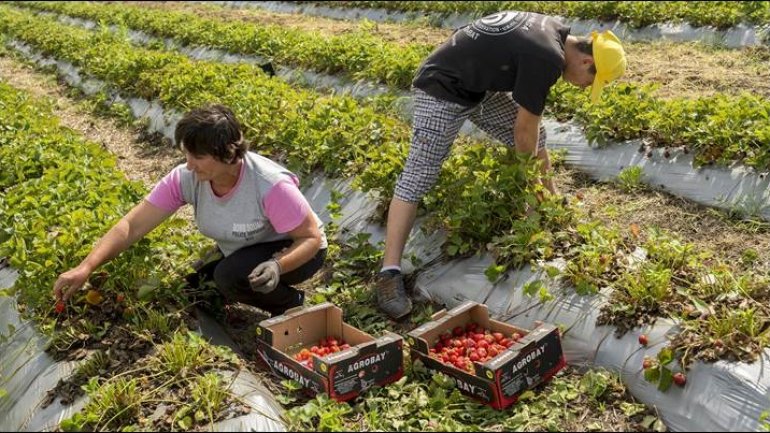Two new FAO projects to be implemented in Moldova by 2019
 foto: fao.org
foto: fao.org
Berry production and the development of rural areas and livelihoods will be the focus of two new FAO projects starting soon in Moldova.
The project agreements were signed here yesterday by FAO Representative in Moldova Raimund Jehle and Minister of Agriculture, Regional Development and Environment (MARDE) Vasile Bitca. The projects have a combined budget of US$ 800 000, and are expected to be completed by 2019.
Read also: FAO and Moldova signed two memorandums of understanding to assist rural development
One of the projects will help build capacities in the area of agriculture and rural development policy – for policy makers, local officials and others who will be involved in preparing and implementing community development plans for three pilot communities. The target communities will be selected soon.
One of the objectives is to help communities attract and absorb funding. Based on identified needs, the project will enable participants to apply for funding for milking machines, tractors, transportation units, or other equipment. Applications will be reviewed on a competitive basis and all equipment procured will also be used for demonstration and training purposes.
“Furthermore, MARDE and FAO will seek possibilities for mobilizing additional resources (through donors),” said Bitca, “for scaling up the project based on the pilot experiences so the demonstration projects in the selected communities will not be stand-alone projects, but rather represent the beginning of a new programmatic approach to rural development from MARDE.”
In the words of FAO’s Jehle, “The project fully supports one of the main goals of our assistance in Moldova: that the people of Moldova, in particular the most vulnerable, have access to enhanced livelihood opportunities, decent work and productive employment generated by sustainable, inclusive and equitable economic growth.”
The rural development project is closely linked with a second project, on strengthening the capacity of smallholders in berry production.
“This project complements rural development efforts with innovative technologies and knowledge, so that Moldovan farmers can achieve the best results from their work and their land,” Jehle said.
Berry production
Farmers will benefit in particular from the establishment of demonstration fields for berry production, where different technologies and berry varieties will be tested and observed. Research findings from these fields will be reflected in training and information materials, which in turn will help enlarge the pool of qualified trainers.
The approach, Jehle said, is to make the knowledge available to extension service providers, research and academic institutions, nongovernmental organizations, public administration and farmer associations. They, in turn, will rapidly spread the knowledge to users and “activate efficient, innovative and sustainable field practices beyond the project.”
Value chain development – and in particular the development of high-value crops – can help generate income for people in rural areas.
The project will create the first berry nursery in Moldova, where local farmers will learn to produce new and improved traditional planting material using innovative technologies. In addition, the project aims on developing manuals and guidelines, that will be disseminated among farmers, farmer associations, extension service providers and Ministry of Agriculture, Regional Development and Environment, on berry production and protection methods for several types of berries.
Another important component of the project is to increase berry farmers’ access to markets and processors.
The berry production sector in Moldova currently consists of about 100 000 farmers, who cultivate the fruit in small household or garden plots.
“International experience, knowledge and access to global genetic materials is a key strength of FAO, which will contribute to the overall goal of MARDE to improve berry production,” said Minister Vasile Bitca.
He concluded that the two new projects are part of a long and successful partnership between Moldova and FAO. They are aligned with MARDE’s priorities to assist small family farms and promote sustainable livelihoods and incomes in rural areas of the country.
Read more at fao.org
Business
- FAO launches project worth $125,000 dedicated to agroecology in Moldova
- Good news for Farmers! Grants to be given in advance
- FAO: Global Food Prices lower as production reaches new highs
- FAO encourages Central, South-East Europe to develop e-agriculture strategies
- FAO launches nationwide campaign in former Yugoslav Republic of Macedonia
- FAO and Moldova signed two memorandums of understanding to assist rural development